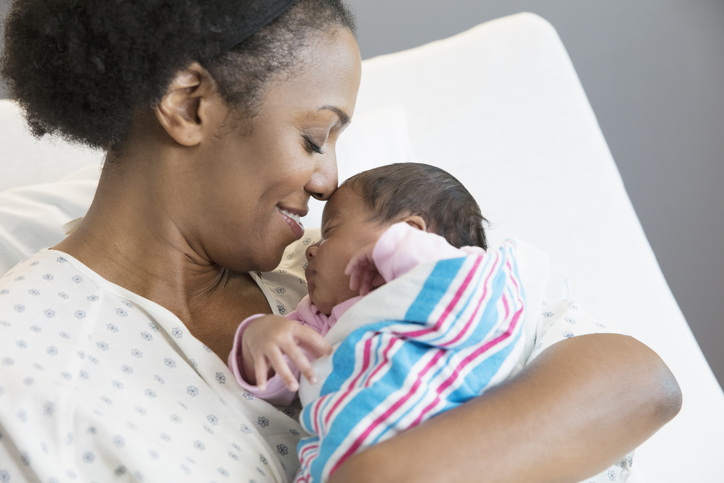Why Supporting Black Midwives And Doulas Matters - Page 2
Share the post
Share this link via
Or copy link

Source: KidStock / Getty
Black women are over three times more likely to die during childbirth and postpartum than white women.
When supported by a doula, Black women saw significantly greater birth outcomes.
But there are a tremendous number of misconceptions about the practice and history of doulas and midwifery. The hosts of Black Health 365, Jackie Paige and Britt Daniels, get into it all in this episode.
On this special episode that’s here just in time for Black Women’s History Month, Jackie and Britt welcome Imani Byers to the podcast. Imani is a full spectrum doula, social worker and founder of Your Rebyrth Tribe Perinatal Wellness Agency. She knows everything there is to know about doulas and midwives – some of the most critical players in the pregnancy, birthing and postpartum process.
First Thing’s First: What Is A Doula Or A Midwife?

Source: kali9 / Getty
Before getting into the nitty gritty, Imani gives a brief description of the commonalities and differences between a midwife and a doula.
Love MadameNoire? Get more! Join the MadameNoire Newsletter
We care about your data. See our privacy policy.
A doula is “A professional trained in supporting birthing bodies during labor, fertility, and postpartum,” says Imani. They offer both emotional and physical support. Imani always tells her clients, “Please stay away from Google. You have a doula for that.”
A midwife offers clinical support to both the mother and, once born, the baby. Midwives are there to ensure a safe birth. There are three tiers of midwives, explains Imani, including certified nurse practitioners, certified professional midwives and traditional midwives who don’t have a certification, but work through an apprenticeship.
The Gentrification Of Midwifery

Source: Stockbyte / Getty
Today, white women dominate the midwife and doula professions – in what Jackie describes as the “Oh my white” phenomenon. But, as Imani explains, the practice of midwifery has solid African American roots.
The first experienced midwives in this country were brought over as slaves, and went on to train others in what would become the prevailing form of birth care.
Unfortunately, Imani explains that white women have claimed the spaces of midwifery and doula work as their own and there’s some “gatekeeping” going on. It’s created a form of unnecessary competition, because, as Imani says, they’re all fighting the same battle – to save lives.
Recognizing the real history of both birthing care professions and supporting Black doulas is extremely important to the health of Black mothers and their babies. With maternal and infant mortality higher within the Black community, Black families need midwives and doulas who culturally understand their experiences. They also know, firsthand, what sort of bias or unequal treatment Black mothers might receive in hospital settings, and are prepared to advocate for them.
The Hospital/Doula/Midwife Relationship

Source: Prostock-Studio / Getty
The relationship between clinical settings and midwives and doulas is a messy and sometimes contentious one, shares Imani. Some hospitals are known to welcome these birthing care professionals with open arms, while others make it very difficult for them to gain access. The COVID-19 pandemic made matters worse, as many hospitals restricted how many people could be in the birthing room. Some of those restrictions haven’t fallen off.
Black doulas and midwives are fighting several battles. They’re fighting to reclaim the recognition they deserve for being the people who created this work. Imani herself comes from a long line of Black birth workers. These professionals are also battling with hospitals to let them do what the mothers hired them to do in a clinical setting, and with insurance companies to extend coverage to their services. Supporting Black doulas and midwives matters – it matters for the survival of Black mothers and Black babies, and for the survival of the birthing work profession for Black women.
-

She Tried It: Inahsi Naturals Aloe Hibiscus Leave-In Conditioner & Detangler
-

Meet Dominique Fils-Aimé, The Haitian-Canadian Star Redefining Jazz For A New Generation: ‘This is My Vision' [Exclusive]
-

Cooking With Purpose — How Brittney Williams Honors Her Caribbean Roots Through Food
-

8 Famous Lesbian Women Who Were Married To Men



